Brandon Stanton's Blog, page 52
July 27, 2020
“My mom cried before they even said cancer. But my dad was stone...
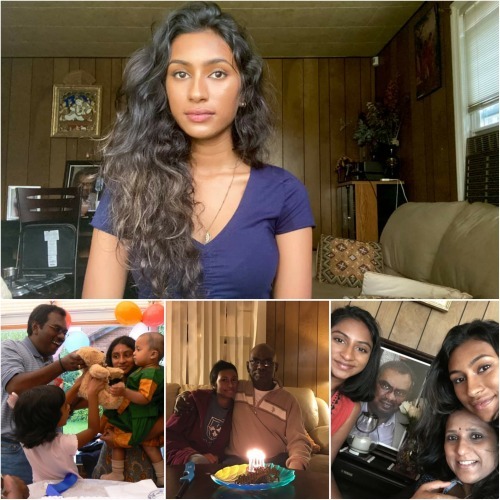
“My mom cried before they even said cancer. But my dad was stone cold, listening to every word the doctor said. It wasn’t until a few days later, when we were going through a list of my possible treatments, that he started sobbing like a child. I was the one hugging him, telling him it was going to be OK. Dad was my best friend. He was the favorite of everyone in our family. He spoiled all my little cousins. He’d let them sleep on his belly. Everyone got a little motorized jeep for their birthday. And he had the biggest laugh, he was always cracking jokes and telling stories. Our house was so lively that I never even felt like I had cancer. My tumor was shrinking, and it was easy to assume that things were going to get better. Then a few months into my treatment, Dad started getting fevers every night. Really high fevers. When we finally took him for a biopsy, he was diagnosed with non-Hodgkin’s lymphoma. I knew that his was the worse of the two. But I didn’t think much about it. I didn’t research survival rates. I was only fourteen, it honestly never occurred to me what could happen. I wasn’t wondering: ‘Will I make it? Will he make it?’ I just focused on getting better. Dad and I started doing our chemo together. We’d give each other encouragement. He’d tell me that I looked like a model with my bald head. I’d tell him the same thing. Whenever I wasn’t nauseous, he’d cook me his signature dish: South Indian Chicken Curry. He taught us all the recipe before he got really sick. We all huddled in the kitchen one night and he explained it to us step-by-step. I’m so thankful that my sister wrote it all down, because a couple months later he was in the ICU. I don’t think my family wanted me to know how bad it was. They didn’t want to jeopardize my recovery. So they kept me from the hospital until the very end. By that time he was heavily sedated. He couldn’t talk anymore. I wasn’t allowed to enter the room because I was still immunocompromised. But they told him: ‘Mani, your daughters are here.’ And he struggled so hard to open his eyes. He had the biggest eyes. Even from the other side of the glass, I could see his eyes. And he opened them as wide as he could.”
July 22, 2020
“I think to understand how it happened, you have to know that he...
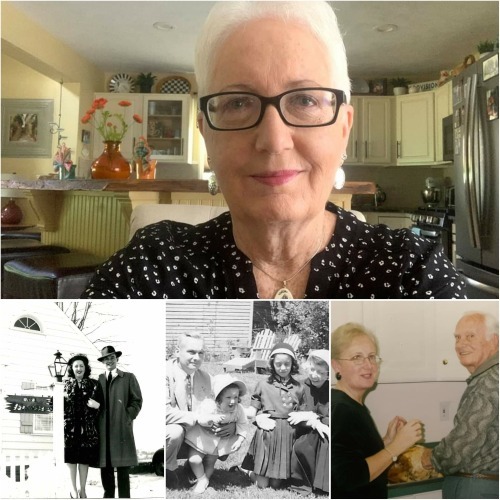
“I think to understand how it happened, you have to know that he adored my mother. They were married for 67 years. He treated her like gold. He always opened doors for her. He did the vacuuming. The grocery shopping. He’d cook us dinner every Saturday. He’d come home from work at 5:30, and anything my sister and I wanted to do—he’d do it: play baseball, go to the lake, anything. I never heard him complain. He never once got mad at me. I wasn’t the best driver, and a couple times I crashed our car into a snowbank. But it was always: ‘Are you OK?’ Not once did he say: ‘What’s the matter with you?’ That’s how he was. He was the gentlest man. My relationship with my mother could be challenging, and Dad knew that. So he tried to make up for it. He was the one who was always there. He was the one that I could go to for anything. He lived to be 96, and not once in my life did I question that he was my father. The truth only came out after his death, when my son decided to get a DNA test. He discovered that he was one-third Italian, which didn’t make any sense. Because nobody in our family was Italian. He did some research and narrowed it down to four brothers. Their last name was Lombardi. That’s when we called my cousin Denise. Her mother had been my mom’s best friend. I asked her point blank: ‘Do you know anything about my biological father?’ There was a long silence. Then I asked her if she’d ever heard the name ‘Lombardi.’ There was another silence, and she said: ‘Mr. Lombardi was your mother’s boss at the jewelry store.’ She went on to tell me that my father had always known. And that he’d decided to forgive my mother. And to raise me as his daughter. And to take the secret to his grave, because he didn’t want to hurt me. I cried when I found out. But that only lasted a minute. Because it didn’t change anything. It didn’t change my amazing childhood. It didn’t change my relationship with my father. Denise told me that she had been there when my parents came home from the hospital. She watched my father carry me in the house. And she said she’ll never forget the look on his face. She’d never seen him so happy in his entire life.”
July 21, 2020
“She was always vague about her life back in Vietnam. The only...

“She was always vague about her life back in Vietnam. The only time I ever pressed her on it was in high school. We were doing this project on our family tree, and I asked about her history. She wouldn’t even look at me. Her hands started shaking. And she started tearing up. ‘It was really hard coming here,’ she said. ‘But I did it so that you could have a better life.’ And she did give me a better life. My childhood was amazing. She brought us to museums and concerts. Every year we went on one big trip. I used to feel guilty around my Vietnamese friends, because a lot of their parents worked in nail salons and were never around. But mom was a career woman. She was one of four women in her engineering class. She hung her graduation photo in our living room, right next to a picture of me. The expectation was clear. She wanted me to graduate. And get a good job. To the point where it felt overbearing. Especially in high school when I was trying to figure out my own identity. I started talking back, which is very disrespectful in Vietnamese culture. And I got involved in bad relationships because I knew she’d disapprove. I just didn’t want to feel like her trophy. Like all that mattered was my education and career. I didn’t want to be the redemption for how hard her life had been. But as I got older, I learned just how hard it was. Other family members filled in the details. Her dad died when she was six and she was separated from her mother. She’d witnessed rape and violence. She’d escaped the war on a boat in the middle of the night. And I began to understand why she was so obsessed with me being successful and independent. Her life had been anything but stable. Yet she’d provided us with so much stability. When my dad lost his job, we didn’t even know. We went to Disney World that year. So I’ve grown to realize how lucky we were. And Mom’s been trying to grow as well. She’s starting saying ‘I’m proud of you.’ Which is weird, but nice. And she’s really trying to ask about things other than work and school. Though when my brother graduated recently, she did pull our entire family’s gowns out of storage. So she could have one final picture for the living room.”
“We came to America when I was two. My father worked as an...
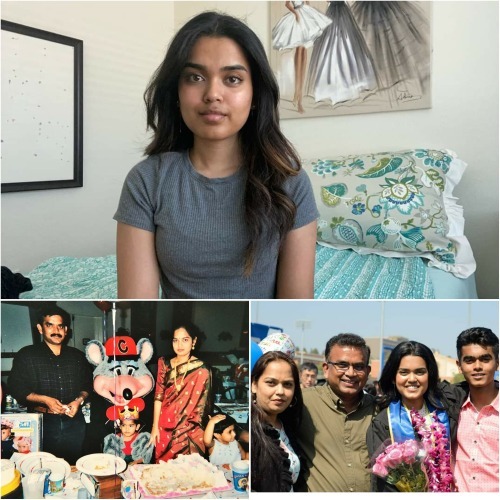
“We came to America when I was two. My father worked as an engineer for a bunch of different tech companies. I’ve always felt like an American. My parents told me that I could be anything I wanted. I do remember them saying I couldn’t get a job when I turned sixteen, but I assumed it was a typical Indian household protecting their daughter. So I focused all my energy into making good grades and getting into college. I finished my applications early. But when I showed them to my mom, she zoned in on one particular part. ‘Be sure to mark that you’re an international student,’ she said. She explained that because of my H4 visa status, the selection process would be much tougher. And I wouldn’t qualify for financial aid. I was devastated. I’d done everything right. I took 14 honors classes. I was 4th in my class. I was even a national champion in artistic roller skating. But none of that seemed to matter. There was a chance I couldn’t even go to college in America. I cried for the entire day, and for the rest of the year my mental health took a really bad hit. I’d wake up in the middle of the night, worried about my future. A lot of those fears didn’t come true. But it has been tough. I was waitlisted at all my top choices. I ended up getting into a good school, but I couldn’t study the arts like I wanted. I couldn’t have the social life I wanted. I’ve had to make every decision based on what gives me the best chance of staying in the country. It’s like I’m always playing a game. And if I mess up once, I’ll need to leave. For a long time I carried a lot of anger. I was jealous of my younger brother for being born here. I was mad at my parents for not telling me. But both of them were born in a village. They gave up so much to be here. They went years at a time without seeing their families. How could I be mad when they sacrificed so much? I think they were afraid of discouraging me. They were focused on me being OK in the moment, and they assumed it would all work out. The American Dream is so well marketed. And when you get here, it feels so close. Like if you just work hard, everything will fall into place. And I think that’s what they always believed for me.”
July 16, 2020
“My biological mother had three kids at a young age, then...
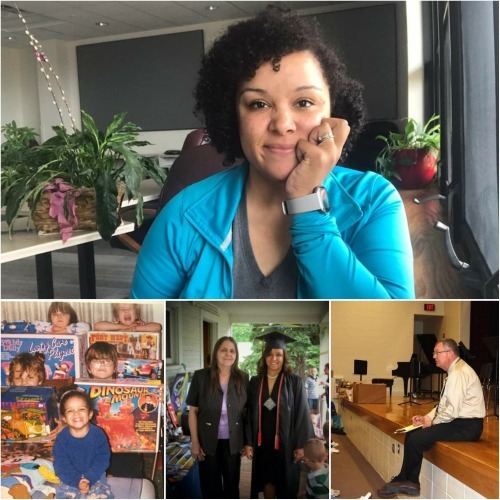
“My biological mother had three kids at a young age, then dropped us all off with my aunt. It wasn’t even a legal adoption, she just signed a piece of notebook paper. My aunt already had three kids of her own, so it was wild in that house. Summers without air. Winters without heat. I loved her to death. And she tried to keep us clothed and fed, but I can’t say that everything she did was exactly legal. She collected disability for some injury that she never wanted to talk about. And she was a bit of a thief. On the first day of school we’d go to the Salvation Army and switch our old clothes for the ones on the rack. My brothers began to model her behavior at a very young age. They drank a lot. They fought a lot. And they stole a lot. The whole town knew about us. On the first day of high school, our principal Mr. Herring pulled me aside and gave me a stern warning: ‘I know your siblings,’ he said. ‘And I hope you remember that we won’t tolerate the same behavior from you.’ I was absolutely devastated. I’d stayed out of trouble my entire life. I’d been determined to show that ‘I’ was better than ‘we.’ But apparently it hadn’t worked. So I tried even harder. I made good grades. I threw myself into musicals and drama and journalism. I even became the first student from our school to go to nationals for speech and debate. I did notice that some of the fees were waived for my activities and school trips, but I assumed everyone was getting the same treatment. Then three weeks before graduation, I was called into the principal’s office. I was horrified. I’d never been in trouble before. Mr. Herring was silent for fifteen seconds, then he said: ‘I made a huge mistake. The biggest mistake a teacher can ever make. I judged you before I ever knew you. And for that—I apologize.’ Then he got up, gave me a hug, and asked me to give a speech at our graduation ceremony. I felt so seen in that moment. After graduation I ended up going back to the school to work as a speech coach. One day I happened to be chatting with an old teacher, and I joked about how I never had to pay for my activities. ‘Oh,’ he said. ‘Your teachers all chipped in to pay for them. Along with Roger Herring.’”
July 15, 2020
“It was my friend’s birthday, and everyone else was twenty-one...
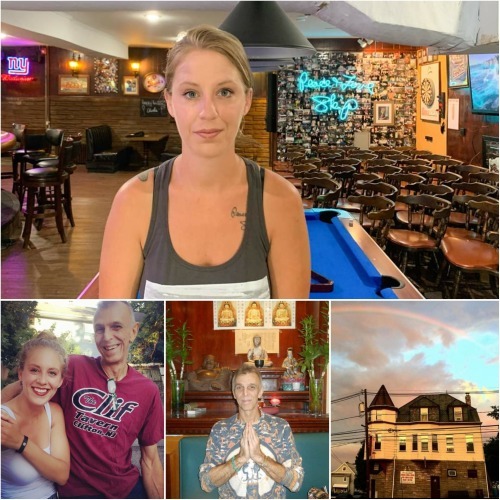
“It was my friend’s birthday, and everyone else was twenty-one except for me. So we went to a bar that wouldn’t check ID. It was called ‘The Clif Tavern,’ and it was a total dive. The cash register was from 1948. The owner was an old, weathered guy named Skip. He seemed very excited to have customers. He told us stories all night long. He talked about meditation, and racing cars, and being a black belt. I remember he was really proud that his brother’s dog had been in a movie with Cameron Diaz. By the time we left, all of us were in love with the place. We started coming back every weekend. And I was hanging around so much that Skip offered me a job as a bartender. He didn’t teach me much. He knew very little about business. He kept all his documents in an empty Budweiser box. But he was the spirit of the place. He gave great hugs. He called everyone his ‘kids.’ And he was a total hippie. Whenever he posted on social media, he’d sign it ‘Peace and Love.’ We worked together for ten years. Skip was with me when I met my husband. He witnessed our first kiss. He became like a father figure to me. And his bar became a huge part of my life as well. Skip used to always say that the bar was ‘killing him,’ and he kept threatening to move to Costa Rica. But he could never stay away for long. There were maybe six days in ten years that he didn’t come to the bar. So when he didn’t show up one evening, everyone knew that something was wrong. The police went to his apartment and found him unresponsive. He’d died of a heart attack. None of us knew what to do. I gave the eulogy at his funeral, and then left to go open the bar. All of us assumed it was the end of everything. But one month after the funeral, I got a call from Skip’s brother. He said he couldn’t sell Skip’s legacy to a stranger, so he offered the bar to me and my husband. Over the past few months we’ve renovated everything. We have a new tap system now. We’ve added a modern register. We’ve made a lot of changes, because we know that it needs to be an actual business if it’s going to survive. But we’ve also covered an entire wall with Skip’s photos and notes. Because we always want the place to feel like Skip.”
July 6, 2020
“Tracey did all the things a big sister would do. She always...
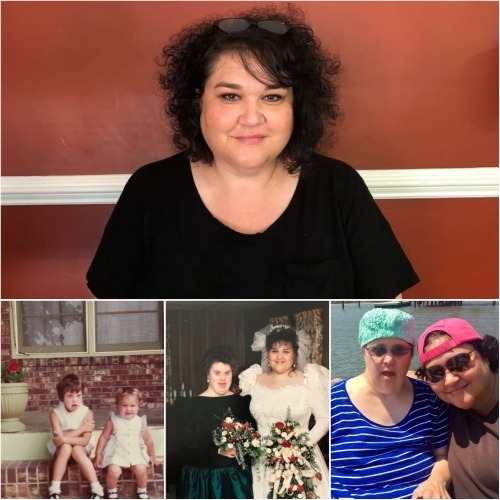
“Tracey did all the things a big sister would do. She always called me ‘Nut.’ She helped me wash my hands, and brush my teeth. We rode bikes and played in the sandbox. Maybe our parents didn’t punish her as much. But other than that, nothing seemed different. I didn’t have a clue. Then one day a boy in our neighborhood called her ‘a retard.’ I remember running home and asking my dad what that meant. He stared at me for a moment, like he didn’t know where to start. And from that day on life was different. It’s not right to say that we weren’t equal anymore. But I went from innocent and not knowing, to feeling like I needed to protect her. Whenever I got invited to slumber parties, she didn’t. Unless I insisted. And she wasn’t invited to prom, but we got her a dress and brought her anyway. When Tracey got out of school at 21, there wasn’t much else for her to do. We didn’t have many programs in our town. So she stayed at home with Mom and Dad while I moved on with my life. Big changes were hard for her. She’d always say, ‘Why does God make us different? It’s not fair, Nut.’ She cried when I went to college. And I think my wedding was hard for her, even though she was the maid of honor. It’s not jealousy. It’s just that she wants to live a normal life too. When I had my two children, I was thrilled to watch her become their best friend, the same way she’d been mine. I always say that we raised them together. She loved my children more fiercely than a mama ever could. But once again, I watched them outgrow her and graduate through life. But Tracey taught them things I never could. My children never blink when people are different. She’s taught us all so much. She just loves everyone. And she rolls with things better than we give her credit for sometimes. Dad passed away in 2018. It was hard on all of us, but I know it was especially tough on her. I watched her during the entire funeral. She was greeting everyone and shaking their hands. And I remember thinking: ‘Wow, this must be so much for her.’ When the last person had left, I walked over and put my arm around her. And told her how proud I was. She just gave me a hug, and said: ‘Love you Nut.’”
July 3, 2020
“It was my first year teaching at a new school. Cristina was...
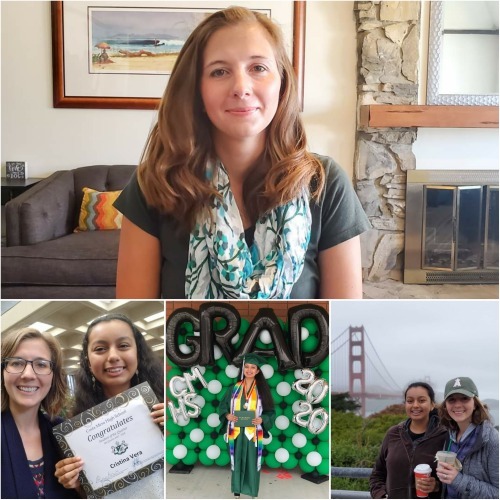
“It was my first year teaching at a new school. Cristina was only an eighth grader, but she was in my enhanced math class. We didn’t bond much that year. Partly because she didn’t need my help. But mainly because I was so frazzled. Being a new teacher is rough. You’re dealing with students from all different backgrounds. You’re trying to teach them the quadratic formula. But also to be a good person, and navigate life. On top of it all you’re having to navigate school politics. So it always seems like there’s a fire to be put out. Sometimes I’d stay late trying to finish extra work, and that’s when Cristina came wandering in. By that time she was a freshman. And she was heartbroken, because she’d just gotten a ‘D’ on a math test. She’d hit a wall. So I gave her practice problems to do on the whiteboard. I enjoyed having her around. It was nice to have someone else in the classroom. And even when she didn’t need my help anymore, she kept coming anyway. We kept up the tradition for four years. We’d put on country music. Then we’d sit on opposite sides of the room and do our work. She went from thirteen to eighteen in my classroom. I watched her grow up. Our conversations matured. We started talking about college. And what she wanted to do with her life. We talked about her first boyfriend. And her first breakup. I got to see it all. Whenever a new class would graduate, it was so sad to see the kids leave. But in the back of my mind, I’d always say: ‘At least Cristina is only in 9th. At least Cristina is only in 10th. At least Cristina is only in 11th.’ But this year her class finally graduated. I knew the moment would come, but it’s still tough. Because they’re the first class that spent all four years with me. They watched me grow. They saw me on my very first day. They saw me come back one summer with a new last name. They were with me when I figured it all out, and they were so smart that they succeeded anyway. Cristina graduated as the valedictorian. She’ll be going to the University of Pennsylvania next year. She wants to be a nurse. And I’m just so proud of her. It’s been such an honor to watch her grow. And I can’t wait to see what she does next.”
“My parents split up when I was seven, so my grandmother was the...
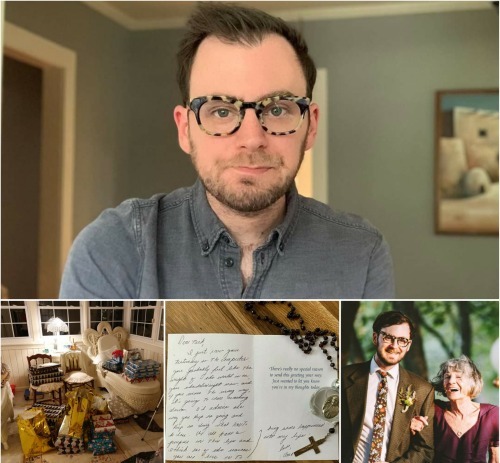
“My parents split up when I was seven, so my grandmother was the one stable thing in my life. She’d cook me dinner, tuck me in bed, then put on her nurse’s uniform and go to work. She was already 65 by then, but somehow she’d still find the energy to cook me breakfast when she came home. She understood me. We shared secrets. Both of us tended toward melancholy, and she made me feel OK about that. We also had similar weaknesses. Oma put everyone else before herself. My grandfather was abusive and abandoned her. But when he got cancer in his old age, she told him: ‘Come back home Joe, I’ll take care of you.’ She nursed him until he died. That’s the kind of person she was. Christmas was always a huge deal for her. It was the main reason she kept working. She’d save up all year for it. Each of her grandkids would get twenty presents, and they’d be stacked to the ceiling. Unfortunately her health was never great because she smoked her entire life. And when I visited her in December of 2017, she was in horrible shape. She couldn’t walk more than a few steps without gasping for air. I remember carrying her up the stairs and putting her to bed. I read her books from my childhood. And she hated every minute of it, I’m sure. Because she hated being cared for. When our time was finished, and I was walking out the door, she told me: ‘Nick, I love you so much. And please don’t tell anyone, but this is the last time you’re going to see me.’ I cried the entire way to the airport. And three days later she died. It was the week before Christmas. My entire family flew to her house for the funeral, and there were tons of presents, for every child and grandchild, perfectly wrapped and placed under the tree. But I was too heartbroken to go. And I think she anticipated that. Because on December 23rd I received a package. It was postmarked the day that she died. Inside was a bottle of holy water, a rosary, and a card that said: ‘Right now you probably feel like the weight of the world is on your shoulders, and it’s going to come crashing down. But keep going. We all have a purpose in life. And one of the reasons you are here was to bring some happiness into mine.’”
July 2, 2020
“I was a single mother of two boys. I was working overnights to...
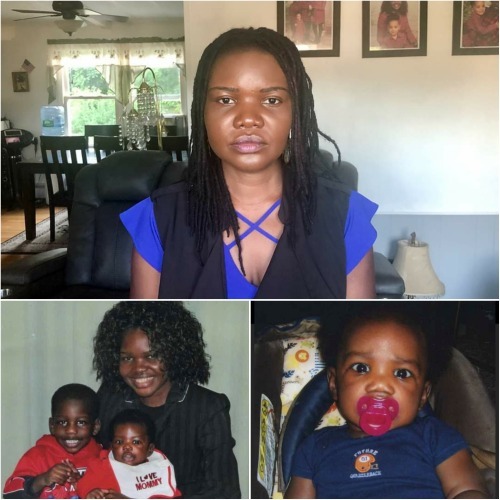
“I was a single mother of two boys. I was working overnights to make ends meet. And I didn’t even have permanent residency, so things were very stressful. Every night I’d drop the boys off with a babysitter on the way to work. On that particular evening, everything seemed normal. Elijah was perfectly healthy. But in the middle of the night, I received a text from the babysitter. She said there was an emergency, and she was taking Elijah to the hospital. By the time I arrived his heart had stopped beating. He was only six months old. The cause of death was listed as Sudden Infant Death Syndrome. A few days later I collected the autopsy results from the police station, and I met the lieutenant who had done CPR on Elijah. He seemed very moved by Elijah’s death, but I didn’t think much of it. I was too overwhelmed by my own grief. I felt completely alone. Elijah’s father hadn’t attended the funeral. And there wasn’t even a headstone on the grave. The only thing I could afford was a small wooden cross. So whenever I visited the cemetery, I couldn’t even find where he was buried. It was like I’d lost him completely. For years I felt so guilty about it. It was such a weight on my shoulders. I felt that I was neglecting his memory, and that I would need to make things right if I was ever going to heal. Then one afternoon I received a call from a local reporter. He asked me if I was the mother of Elijah. And he told me that he was working on a story about a police officer who was raising money to buy a headstone. It was Lieutenant Jim Janso. The same officer who’d given Elijah CPR. The reporter arranged for us to meet at Elijah’s grave. Jim comforted me. He told me that all these years he’d thought I moved away. But he never stopped thinking about Elijah. He’d kept visiting his grave: every Christmas, every birthday, and every anniversary of his death. In that moment, I broke down. The weight of the world was lifted off of my shoulders. For the past four years I’d been crying to God. I was convinced that Elijah had been abandoned. But that entire time, all those years I thought he was lost, and forgotten, there had been an angel watching over him.”
Brandon Stanton's Blog
- Brandon Stanton's profile
- 768 followers



